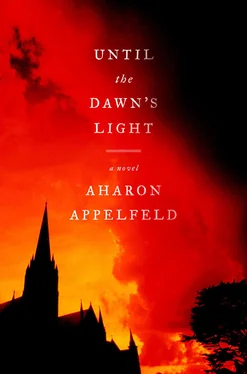At first she deluded herself into believing that it was just a passing thought, but when he kept pressing her, she understood that he wouldn’t let up. A new fear possessed her. I’ll run away, she said to herself, but she knew she didn’t have the strength to go far: Adolf’s huge hand would reach her. Once he said to her, “I never miss a thing. I know all your intrigues.”
The next morning, after Adolf went to work, she prepared some sandwiches, dressed Otto, and they set out for Blumenthal. The old age home in Blumenthal was different from the one in Himmelburg. The building was spacious, and around it was a well-tended garden. The director of the place asked for information about Blanca’s life, and she told her.
“And who will take care of your child?”
“A country woman.”
“We’re very strict here about lateness and absence.”
“I’m orderly.”
“So, you’ll start in a week, on Tuesday at eleven o’clock. I’m writing it in my journal.”
When Adolf came home from work, she announced to him that she had found a temporary job in the old age home in Blumenthal. Without looking her in the eye, he said, “Fine. We have to find a woman from the country.” Later he asked when she would be starting her job, and Blanca told him.
It was a week of rain, fear, and great weakness. At night she begged, “Don’t press so hard on me. I can’t breathe.” Those pleas just increased his fury. But for some reason he didn’t hit her. Toward the end of the week she said, “Otto, I’m going out to work. I have no choice. What can I do?”
Blanca washed, ironed, and prepared clothing and bedding. The dread she felt at the thought of being forced to part from Otto in a few days clung to her body like a cloak of fire. Again she saw her mother’s prolonged, slow death. During the last months of her life, her mother had struggled to get up every morning and tidy the house. Her father would try to help her, but his assistance wasn’t effective. Her mother would say, “Erwin, why don’t you sit down and tell me something.”
“What should I tell you?”
“What you want to tell me.”
She tried to be especially pleasant to him, to renew the old hopes, and she managed to do so. Blanca’s father was elevated by his wife’s optimistic mood, and he began to make plans again. Her mother knew in her heart that the plans would lead to nothing, but she listened to everything he said. She knew that in a little while he wouldn’t have an attentive ear. In the last months of her life, her love had been soft and merciful. At the time, Blanca hadn’t grasped the wonder of it. Now it was as if the light of their faces shone again.
ON MONDAY ADOLF brought home a tall, strong woman from the country and said, “This is Kirtzl. Show her what to do in the house.”
“I’ll show her everything,” Blanca said in the tones of a maidservant, and went right out into the garden.
“This is the vegetable garden,” she said. “In this season there are eggplants, squash, and also cabbage.” Blanca looked at the woman closely: her face was full and flat, and a heavy smile hung on her lips.
“Do you water the garden?” Kirtzl asked stolidly.
“In weeks when there’s no rain.”
They passed on into the kitchen, and Blanca said, “There’s wood in the shed.”
“You don’t use charcoal?” Kirtzl asked in the same tone of voice.
“No,” Blanca said, and the word reverberated in her head for a moment.
Then they went into the bedroom, and Blanca said, “This is Otto. He’s not an infant anymore. He sleeps through the night, eats well, and he’s developing nicely. Do you know how to take care of children?”
“I have three.”
“How old are they, if I may ask?”
Kirtzl smiled. “They’re already in school,” she said.
“Do you want to have a cup of coffee, perhaps?”
“I wouldn’t object.”
Adolf went out with his friends, and the two women sat and talked. Kirtzl told Blanca that her husband had run off six years earlier, and his trail was cold. The children had been little, and she raised them.
“Didn’t the police look for him?”
“Go look for a needle in a haystack.”
“I also have to go to work.” Something of the woman’s voice clung to Blanca.
“Don’t worry. I’ll watch out for your husband and son. You can rely on me.”
Blanca’s former life seemed like a dream to her: she had been a free person, she had parents who loved her, she was excelling in high school, she read books, and in the afternoons she would sit with her father in My Corner. And then, because of a grave sin that she had committed, she became a prisoner. Until now she had been in this prison, and tomorrow she would be transferred to another one.
Kirtzl seemed to comprehend her thoughts and said, “I don’t complain.”
“No?”
“I’ve learned to grab whatever comes my way,” she said, pursing her lips.
“How?”
“Don’t you understand?”
“I,” Blanca said, “never leave the house.”
“If so, this will only do you good.”
Blanca felt that this sturdy woman had a lot of strength, but she couldn’t tell what kind it was. At any rate, she noticed: Kirtzl had sat down on the chair slowly, and when she was sitting there, her body filled it.
“Where have you been working until now?” Blanca asked.
“In the village.”
“Weren’t you happy there?”
“The men molested me,” she said, and her smile revealed her large teeth.
“Here things will be quiet for you,” Blanca said distractedly. Then she ran out of words. “Kirtzl,” she said.
“What?”
“It’s hard for me to part from Otto.”
“Don’t be emotional,” Kirtzl said. “It isn’t good to be emotional. Life is rotten.”
Blanca couldn’t sleep that night. Evil visions horrified her, and she sat in the dark kitchen, awaiting the morning. The night was long, and she knew clearly that without Otto, her life would be even more abject. The statue of the crucified Jesus that hung above the altar in the church appeared before her. But for some reason his face was strong and angry.
Before going to work, Adolf reminded her that she had to come home on Saturday afternoon to prepare the house for Sunday. Blanca was groggy, but still she ironed his shirts and arranged the cupboards. Finally she fell to her knees and begged Otto not to cry.
Kirtzl arrived at eight, and Blanca rushed out to catch the morning train. On the way, she met a former classmate. Andi was a simple, reliable girl whom Blanca had thought about now and then. Now, when she met her, she could say only, “Excuse me, I’m running to catch a train.”
Andi, astonished by her sudden appearance, called loudly after her, “God preserve you.”
Blanca got to the station at the last minute, bought a ticket right away, and boarded the train. The buffet car was empty, and she ordered a brandy. During her pregnancy and for some time afterward, Blanca hadn’t drunk. Now she felt a strong thirst for a drink. The first shot of brandy blurred her, and she saw the statue of Jesus again. His face had changed once again: now it didn’t seem angry, but determined, as if he were about to detach himself from the nails and take revenge against his tormenters.
Then her head emptied. The blur thickened, and a dull pain took hold of her scalp, spreading across her temples and down to the nape of her neck.
“Do you have a damp cloth?” she asked the waitress who was serving in the buffet. “My head is splitting with pain.”
The waitress handed her a cloth.
“Here,” she said softly. “This will make you feel better.”
Hearing her soft words, Blanca burst into tears.
Читать дальше








![Traudl Junge - Hitler's Last Secretary - A Firsthand Account of Life with Hitler [aka Until the Final Hour]](/books/416681/traudl-junge-hitler-s-last-secretary-a-firsthand-thumb.webp)



